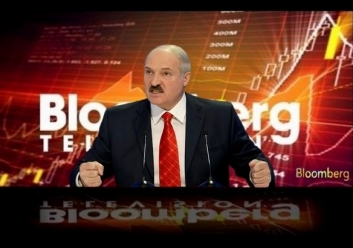Official Minsk is attempting to "bridge East and West"
 The situation has not changed
The situation has not changed

Official Minsk is attempting to become “a bridge between East and West” in order to relieve tension in relations between the Kremlin and Western capitals. President Lukashenka has attempted to become the Kremlin’s ‘interpreter’ for Western audiences and publicly underscored his loyalty to the Kremlin. Amid the upcoming presidential campaign, he has also formulated the terms for a new social contract with the population, which provides for reduced social protection and security in exchange for “peace and stability” in the country.
Last week, President Lukashenka gave an extensive and exclusive interview to the Bloomberg media holding. As always, he made some statements that allow for ambiguous interpretations and were differently highlighted in the western, Russian and Belarusian media.
The Belarusian state-run media, targeting domestic audiences, highlighted President Lukashenka’s exceptional role and efforts in resolving the conflict in Ukraine, maintaining social and economic stability in Belarus and preserving independence and peace in the country. Ahead of the presidential campaign, the president has formulated the new terms for the social contract with the population, which envisages reduced social protection and lower incomes, “Belarusians have long understood that the state’s stability should be the top priority, that peace is the main thing. We can buy everything else. We may be a bit poorer compared with others. We do not have many natural resources to be very rich. But we live in a peaceful country, where our children and elderly will not die from bullets”.
For Western audiences, President Lukashenka attempted to interpret the true motives behind President Putin and the Russian elite’s actions with regard to Ukraine and former Soviet space, “In the West, there is a perception that he (Vladimir Putin) wants an empire restored. He is, in fact, a different person. He will not seek to restore an empire. But if someone will look for trouble and will point fingers in Russia’s direction, or will dangle a stick before eyes, then not only Putin – the Russians have such a mentality – Russia [as a whole] will respond…”
The president said, that the Kremlin would accept a scenario, when Ukraine preserved parts of her eastern regions occupied by the separatists, but with a special status, changed the constitution and restored destructed areas at own costs. According to the president, the Kremlin was also willing to contribute to the conflict de-escalation in the Donets Basin, allowing the Ukrainian authorities to regain control over the eastern border, “and to close the border between Ukraine and Russia. By the way, Russia is not against it.”
The Belarusian authorities are attempting to bring the peace process to a new level by proposing to reduce confrontation between Washington and the Kremlin through direct negotiations:”the United States are playing a crucial role in this process, both, in terms of domestic political processes in Ukraine, and in terms of taking part in negotiations between Russia and Ukraine. This is very important.” The Belarusian government is attempting to play on the Kremlin’s ambitions – according to Minsk, the latter seeks to regain the ‘world power’ status and become a geopolitical player equal to the USA.
In addition, President Lukashenka is seeking to fully isolate his opponents from influencing the agenda of Minsk’s relations with the West. The president in his interview focused on demonstrating the opposition’s weakness and attempted to present himself as the only guarantor of Belarus’ independence. In addition, he underscored that the opposition had abandoned its attempts to change the regime. Interestingly, the Belarusian state-run media has completely ignored President Lukashenka’s statements about the opposition.
Belarus is trying to balance between the ever-growing dependence on Moscow and the pressure from Western capitals to change the political regime by strengthening her positions as “a bridge between East and West”. In addition, the new terms of social contract, proposed by the authorities, do not imply changes in the government policy and ensure the existing socio-economic model is preserved.
Subscribe to our newsletter




Situation in Belarus
Constitutional referendum: main consequences


 Video
Video
How to count the political prisoners: are the new criteria needed?


 Video
Video
Paternalism In Decline, Belarusian Euroscepticism, And The Influence Of Russia


 Video
Video












